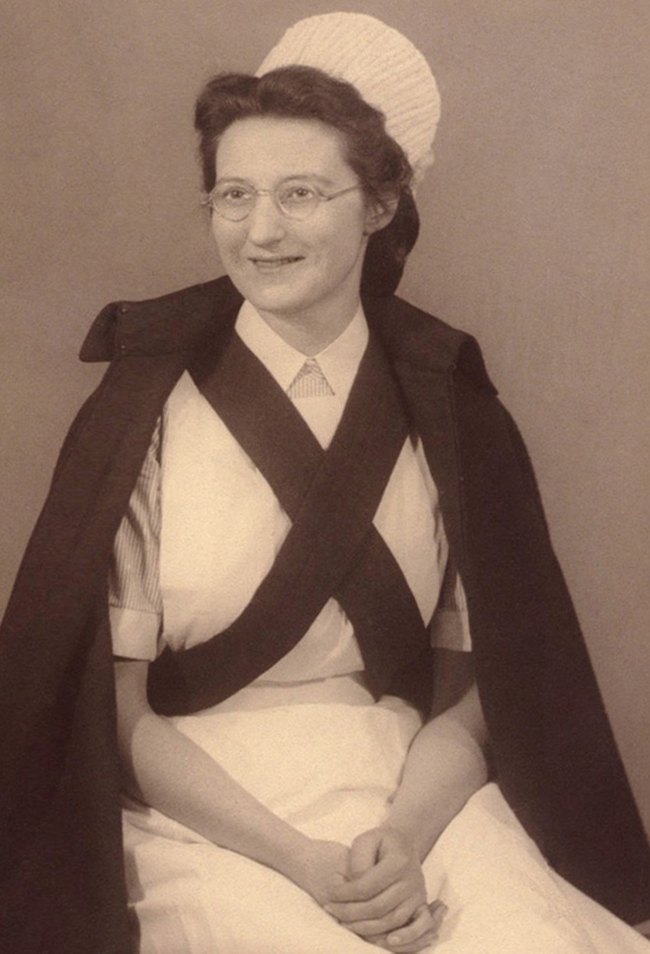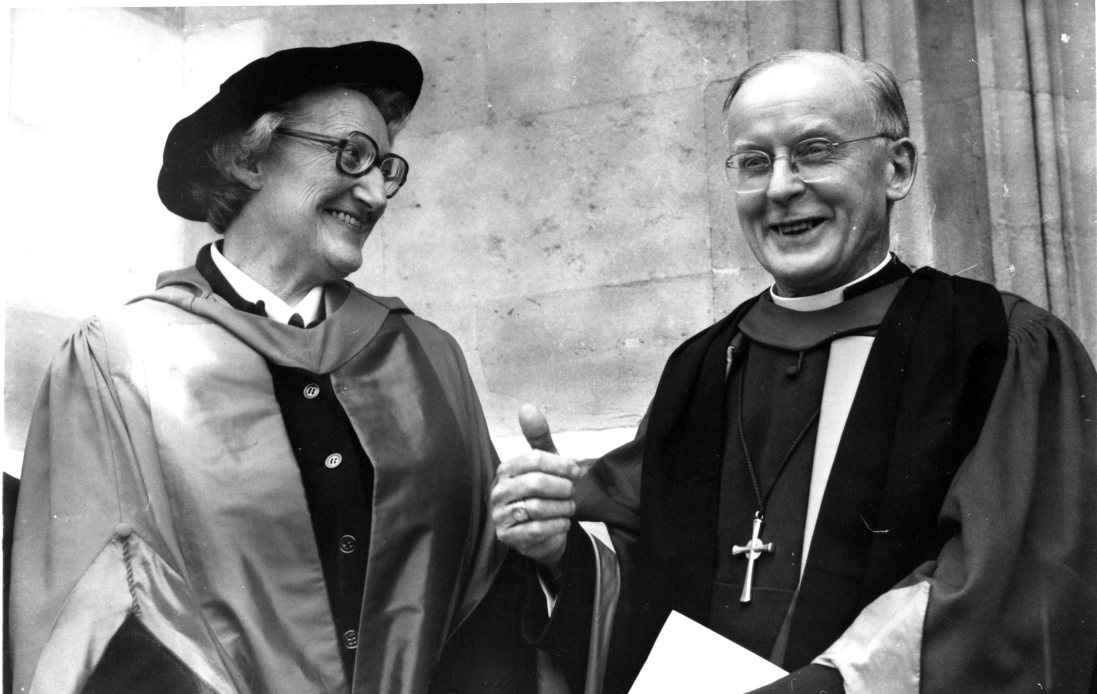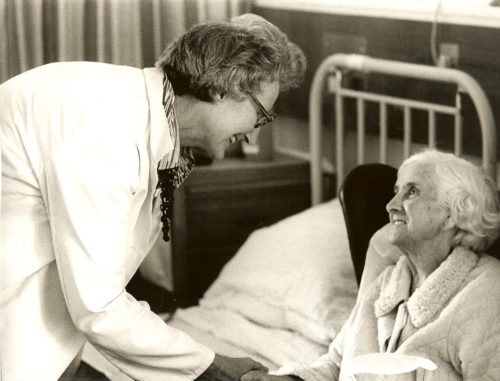Dame Cicely Saunders – Nurse, Doctor and Founder of Modern Hospice
Cicely Saunders, or as she would eventually be known: Dame Cicely, is a reaffirming and refreshingly different person entirely than the previous woman physician we listed in our quest through the top 50 most influential physicians of all time.
Both were born to privilege. Both had difficult, parentless upbringings. Both succeeded greatly against odds and difficulties. Both had altruistic desires; but, Dr. Saunder’s difficulties made her a person of great compassion and selflessness.
Dr. Saunders with a patient
Doctor Saunders had several different careers but all leading to one goal: that of making the plight of the dying more uniformly cared about and cared for. And she did it BEFORE Dr. Elisabeth Kübler-Ross even published her seminal book.
Dame Cicely Saunders (1918-2005) #29
Founder Of The First Modern Hospice
Cicely Mary Strode Saunders was born in Barnet, Hertfordshire, England, the first of three children, on June 22, 1918 to Philip Gordon Saunders and Mary Christian (Knight) Saunders.
Early Life and Education of Cicely Mary Strode Saunders
Cicely and her two siblings, John Frederick Stacy Saunders and Christopher Gordon Strode Saunders, were brought up in a house of privilege with tennis courts and vast gardens but with unhappily married parents who were either preoccupied or cold and indifferent.
Their father, an estate agent, was himself the last and seventeenth child of an entrepreneurial photographer who died when he was one and had gotten into surveying because you could do it and start getting paid from the start.
His intense drive and personality propelled him into a position as senior partner of an estate agency at only 28 but at the expense of his family. Their mother, on the other hand, was there; but was so remote and cold that she could have just as well not been.
At the age of one, Cicely was turned over to her mother’s unwed aunt Daisy to care for and raise, only to be snatched back when her mother became jealous of Daisy’s influence. Their father considered their mother inadequate and uncaring but was so disengaged that, incredibly, it was left up to Cicely to inform her mother that her marriage was over and that she must move out.
Obviously, Cicely’s life was one of caring for everyone around her without receiving much caring herself. She became interested in other’s problems and not in self-pity.

At around 13 she was sent unexpectedly to the Roedean boarding school (1932-1937) where she felt she never fit in, being tall and shy with a scoliosis which limited her activities and which gave her a feeling for people who were outsiders. She was made to lie flat on the floor for almost an hour every day in an attempt to straighten her back.
She desired to become a nurse but her father opposed so she entered St Anne’s College at Oxford reading politics, philosophy, and economics. The outbreak of WWII however gave her the fortitude to break with her father’s wishes and enroll in nursing at St. Thomas’ Hospital in 1940.
Education and Career
She was immediately recognized as a “high flyer” but just as she qualified as a State Registered Nurse her back became a big problem and she was told she couldn’t go on nursing; so, instead, she returned to Oxford for a year, gained a “war degree” and qualified as a “lady almoner” in 1947 or what is now known as a medical social worker.
Early in her training she became intensely interested in the plight of dying patients especially those with cancer. Although the terms hadn’t solidified, the concept of palliative care was practiced during her training but showed needless variability depending upon institution and physician. She volunteered at the St. Lukes home for dying poor in Bayswater and saw true concepts of care for the dying and developed her concept of treating a patient’s “total pain.”
She had a “road to Damascus” experience and converted to evangelical Christianity which further solidified her dream and focus to solve that inequity and was advised she couldn’t succeed witout being a physician… so became one, her third degree and career.
After graduation from St. Thomas’ Medical School in 1957, she began research under a large grant, which revolutionized pain care for the dying. The use of morphine needed evidence not just opinion to overcome the usual physician tendency to wait until the patients were virtually screaming for help.
In 1960 her second husband, her father and a friend all died which, she said, put her into pathological grieving and spurred on her ideas for creating “hospice care” facilities. She began lecturing on her procedures and creating close relationships with American Institutions.
In 1963, 64 and 66 she went on extensive speaking tours of the US and Canada and took her “Hospice” concept to American Institutions with the support of many willing collaborators including Elisabeth Kubler Ross who eventually wrote the seminal work “On Death and Dying.”
Her dream of a dedicated hospice facility was realized in 1967 with the opening of her St. Christopher’s Hospice, the fore-runner to similar facilities in the America.
Later life:

In 1965 she was made an Officer of the Order of the British Empire which began a long list of awards and prizes, including: the British Medical Association Gold Medal for services to medicine, the Templeton Prize for Progress in Religion, the Onassis Prize for Services to Humanity, the Raoul Wallenberg Humanitarian Award, the Franklin D. Roosevelt Four Freedoms for Worship Medal.
She was made a Dame of the Order of St Gregory the Great by His Holiness The Pope, given the Order of Merit by Queen Elizabeth II and won the Conrad N. Hilton Humanitarian Prize, the world’s largest humanitarian award.
Dame Cicely, as the people knew her, died of cancer in 2005 at the age of 87, at St. Christopher’s Hospice, the hospice she had founded. A Service of Thanksgiving for her life and work was held at Westminster Abbey in March 2006 which was attended by nearly 2000 people.
Biographic Summary
Cicely Mary Strode Saunders was a nurse, medical social worker, physician and researcher
Born: June 22, 1918, Barnet, Hertfordshire, England
Died: July 14, 2005 (87), South London, England
Education: 1957 King’s College London GKT School of Medical Education
Known for: Seminal research in pain management, management of “total pain,” palliative care, and as the founder of the worldwide Hospice program
Parents: Philip Gordon Saunders and Mary Christian (Knight) Saunders
25 Posts in Top 50 Doctors (top50) Series
- 27 - Charles D. Kelman - Cataracts – 9 Mar 2023
- 28 - Cicely D. Williams, Kwashiorkor, Breastfeeding, Whistleblower – 21 Jun 2022
- 29 - Dame Cicely Saunders, Hospice – 23 Apr 2018
- 30 - David L. Sackett, Evidence-based Medicine – 2 Apr 2018
- 31 - E. Donnall Thomas & Joseph Murray, Bone Marrow Transplants – 23 Feb 2018
- 32 - Elizabeth Blackwell, women in medicine – 29 Jan 2018
- 33 - Elisabeth Kübler-Ross, stages of grief – 5 Jan 2018
- 34 - Watson & Crick, DNA – 2 Dec 2017
- 35 - Mahmut Gazi Yaşargil, Micro-Surgery – 24 Oct 2017
- 36 - George Papanicolaou, Cytopathology, Cancer – 29 Sep 2017
- 37 - Dr. James Parkinson, Parkinson's Disease – 1 Sep 2017
- 38 - Dr. John Snow, cholera – 20 Aug 2017
- 39 - Dr. Joseph Kirsner, GI Joe – 27 Jul 2017
- 40 - Lawrence (Larry) Einhorn, chemotherapy – 16 Jun 2017
- 41 - Robert Koch, modern bacteriology – 21 Mar 2017
- 42 - Stanley Dudrick, TPN – 28 Feb 2017
- 43 - Stanley Prusiner, neurodegenerative diseases – 25 Jan 2017
- 44 - Victor McKusick, medical genetics – 3 Jan 2017
- 45 - Virginia Apgar, anesthesiology & newborn care – 12 Nov 2016
- 46 - William Harvey, circulation – 12 Oct 2016
- 47 - Zora Janžekovič, burns – 26 Sep 2016
- 48 - Helen Taussig, blue babies – 3 Sep 2016
- 49 - Henry Gray, anatomy – 3 Jul 2016
- 50 - Nikolay Pirogov, field surgery – 11 Jun 2016
- Top 50 Doctors: Intro/Index – 10 Jun 2016
Advertisement by Google
(sorry, only few pages have ads)

